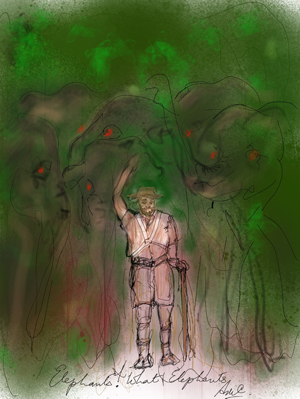The cry of the devil bird!
 One road from the central hills to the east coast at Pottuvil meanders through the foothills of Siyambalaanduwa and Moneragala reaching the flat where it passes the tank at Lahugala. The Wild Life Protection Society had at one time a little bungalow jutting out into the tank on a narrow peninsula off the bund on which a straight stretch of the road ran. This jewel was surrounded by trees and almost at any time of the day large numbers of elephants were seen in and around the great expanse of water that was the tank.
One road from the central hills to the east coast at Pottuvil meanders through the foothills of Siyambalaanduwa and Moneragala reaching the flat where it passes the tank at Lahugala. The Wild Life Protection Society had at one time a little bungalow jutting out into the tank on a narrow peninsula off the bund on which a straight stretch of the road ran. This jewel was surrounded by trees and almost at any time of the day large numbers of elephants were seen in and around the great expanse of water that was the tank.
That I visited this bungalow frequently was one of the great privileges of my childhood. It also was full of birds, and I scored my first Red Faced Malkoha here, and a Black-capped Purple Kingfisher, though my father and I quarrelled about this, each seeking support from our battered copy of GM Henry’s Guide to the Birds of Ceylon to support his case.
In 1975 and recently out of an Irish medical school, I brought my young family to Sri Lanka and we travelled around my old haunts in a Land Rover. Of course Lahugala was on the list, and we drew into the bungalow late one afternoon. There would have been a hundred elephants in and around the tank, and we watched them happily until the sun went down over the hills, lighting the sky with purple and gold as the call of peafowl on the roost ushered in the jungle night. Lamps were lit, the children bathed and fed, and stories were read by lamplight. I opened the bar, and my wife and I settled down to a contemplative Arrack and Ginger Beer, while Jinadasa, the somewhat querulous caretaker busied himself in the kitchen with dinner. The continuous drone of a million frogs was counterpoint to the tuctuculations of the many nightjars, while the occasional rumble or trumpet from afar enhanced the otherwise sumptuous silence. No one ever drove on the main road after dark because of the certainty of meeting elephants.
Suddenly, the tranquility was shattered. A hoarse high pitched wail, descending into a bubbling choking gasp, shortly to be repeated. The kitchen door opened, Jinadasa stepped onto the verandah, the whites of his eyes very visible. And again the horrible choking cry, seemingly closer. Jinadasa stepped backward, as if struck. He turned to us and uttered the terrible word “Ulama”(the Devil Bird) of dire portent. Now, I had a good hearing of the Forest Eagle Owl many years previously while in an Uda- Walawe campsite, and wasn’t so sure, though what we were hearing was truly appalling. I downed my drink and felt sufficiently brave to go and have a look.
Despite Jinadasa’s entreaties (there is room here for you to die from this!), I got into the Land Rover and slowly drove out onto the main road about a half mile away. There were elephants all about and it was slow going. Meanwhile the horror was continuing, and it was getting closer. I stopped in the middle of the road, and awaited developments.
And then suddenly it hit me. It was neither devil nor bird, but a human voice, and singing a strained version of Nessun Dorma. I switched on the headlights, and presently the bard, a bushy bearded Englishman (there were no mad dogs about) stepped into view. He was carrying a walking stick, had a large backpack, and a comfortable looking jungle hat perched on top of a russet head. He got into the front seat, and we chatted away while I drove him back to the bungalow. Jinadasa was horrified to see the devil now incarnate, but eventually agreed to give him dinner.
We sat down and anointed his tiring vocal cords with arrack, and passed a pleasant hour. I pressed him on his journey particularly over the bund. “Elephants,” he said. “What elephants?” As to what he was doing he was quite forthcoming. He was on his last furlough from his job as the British Governor of the Solomons in the Western Pacific, and would be shortly returning to the Solomons to hand over to the local people. And what do you do when on your last leave? Why, you walk across Sri Lanka, and you sing your way through one of the great concentrations of elephants in the world. Even Italian Opera.
After dinner he put on his rucksack, and picked up his stick and said his goodbyes. I was having none of it, and put him in the Land Rover and drove him to Pottuvil.
Wikipedia gives the details. Sir Donald Luddington KBE, CMG, CVO,1920- 2009. A decorated war hero, and among other things in a distinguished CV, the last Governor of the Solomons. He spent his childhood in Ceylon where his father was in the civil service. And his hobby; walking.
As to the gem that was the Lahugala bungalow, alas it is no more. Blown up during the war, and a brace of elephants machine-gunned in the tank as an encore.
Post script- I wrote to the British High Commission to check the dates of Sir Donald’s visit, and whether they had any more information on this most interesting man. But no response, alas.


